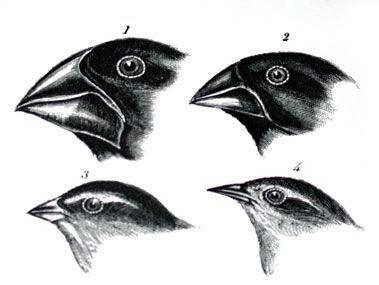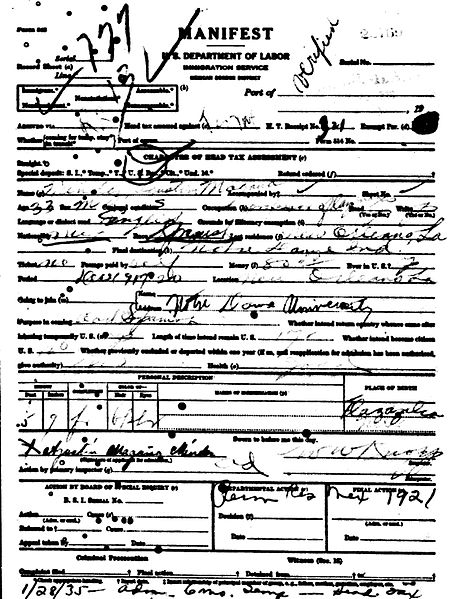WORLD POLITICS: PART I
We begin!
In this first section of our course, I shall identify the defining aspects of the Modern Nation-State. I shall also outline the characteristics of the particular expression of this state that we know best: Liberal Democracy. I will draw a connection between two perspectives we all share in common: “modernity” and “liberalism.” At this early point in the semester, we will deal with several abstract concepts. In the coming weeks, these abstractions will become real to you when we consider the origins and evolution of the liberal nation-state.
My personal guarantee: By the end of this course, you will see how my abstractions fit together into one neat and tidy, dynamic story. First, we need to agree about the meaning of the terms we use.
1. LECTURE: Wednesday, August 28
Reflections on the evolution of political institutions: The making of the Modern Nation-State and the indeterminate nature of human history.
Today’s Assumption: The Modern Nation-State is distinguished by its capacity to bring together different peoples and contending identities. This state form represents a novel way of organizing human beings. To be clear, not all states are Nation-States. And, not all peoples want to live together. Just look at the disastrous consequences of our experiments in nation-building in Afghanistan and Iraq!
Assignment: Watch the video below and reflect upon the issue of historical change. Also, look ahead to your Friday discussion section.
The nature of historical change as seen by a paleontologist. Stephen Jay Gould talks about the approach to studying fundamental change that I find totally convincing—the theory of evolution.  Watch at least the first 6 minutes of this stimulating video: LISTEN As you listen to Gould, ask yourself how his arguments about both human evolution, “punctuated equilibrium” (what does this concept mean?), and the extinction of dinosaurs can be applied to the evolution of political ideas and institutions.
Watch at least the first 6 minutes of this stimulating video: LISTEN As you listen to Gould, ask yourself how his arguments about both human evolution, “punctuated equilibrium” (what does this concept mean?), and the extinction of dinosaurs can be applied to the evolution of political ideas and institutions.
2.DISCUSSION SECTION, Friday, August 30
Important information about a scheduling change: This week, Hannah Early Bagdanov’s sections (POLS 12400-01 [17490]) and POLS 12400-03 [17491]) will meet at the regular times on Friday. Since Sam Piccolo will be at a professional conference (along with me) on Friday, his sections (POLS 12400-02 [15092] and POLS 12400-04 [15090]) will meet on an exceptional basis on Monday, September 2 (at 5:00-6:00 pm in Jenkins Nanovic Halls B052 and on Tuesday, September 3 (at 6:45-7:45 pm, also in Jenkins Nanovic Halls B052. Feel free to come to either meeting.
Both Hannah’s and Sam’s sections will return to the regular schedule next Friday, September 6.
Now it’s time to begin reading!
Here is your discussion theme: “What does it mean to be a real American?”
How do we decide who belongs in the United States? How do we decide who does not? Assuming you are an American citizen, how did you acquire this title? Should every American do more to reasonably be called a citizen? If so, what?
Trigger Warning for Liberals! Many of these readings come from conservative sites and/or conservative writers:
Primary Reading: Samuel Huntington, “The Hispanic Challenge” (Foreign Policy): PRINT AND READ
Huntington was a preeminent political scientist. Note his incredible prediction on p. 14.
Emma Lazarus, “The New Colossus,” a plaque on America’s Statue of Liberty: PRINT AND READ
Edward Hudgins, “What is an American?” (the libertarian Cato Institute) PRINT AND READ
“Alan Dershowitz, “Birthright Citizenship is Bizarre” (the Alt-Right Breitbart News) PRINT AND READ
Christopher Manion (PhD, Political Science, Notre Dame), “The Catholic Bishops and Immigration Reform” (the traditionalist Catholic magazine, Crisis): PRINT AND READ
What is an American Car? READ Why am I asking you to read this article?
Consider this policy: “Israeli Law declares the country the ‘nation state of the Jewish people’,” New York Times, July 18, 2018: READ AND PRINT Does this policy make Israel more or less of a nation-state?
Assignment: Write a one-paragraph (no more!) response to the following question: “In your opinion, what is the single, most important requirement for being a ‘true American’.” You may only choose one requirement. The point of your paragraph is to persuade the reader why it is the single, most important factor.
Your paragraph should be typed and double-spaced (12 point).
Your TAs will tell you how and when to turn in this and future paragraphs.
3. LECTURE: Monday, September 2
Reflections on what it means for citizens of the United States to live in modern times.
Today’s Assumption: We are all Modern. By this statement, I mean that we share conceptions of truth and ideas about how to organize our lives which differ fundamentally from those held by other societies in the world.
Jen Christensen, “The Most Accurate Clock in the World is Redefining the Second” READ What can a mechanical clock tell you about modern society?
Oprah Winfrey on pursuing the truth: READ
Alan Burdick, “Some Good News, and a Hard Truth about Science,” New York Times, November 18, 2018 READ
Until recently, the publication of Adolph Hitler’s Mein Kampf was forbidden in Germany. Nonetheless, should we prevent the distribution of any book? READ
An essential part of being modern is agreement on facts. As a result of our capacity to reason, we pursue factual knowledge and build theories by using the scientific method (even though we don’t always recognize that this is what we are doing). The acceptance of a factual claim (e.g., a heliocentric model of our solar system) does not prevent us from holding a religious faith (e.g., the existence of God). The believer’s faith in God may be just as true as factual knowledge. Throughout much of its history, the Catholic Church has maintained that there is no contradiction between the acceptance of factual knowledge (reason) and faith—these truth claims are simply different forms of knowing.
4. LECTURE: Wednesday, September 4
Reflections on a political invention, the Liberal Nation-state. Liberalism is a specific way in which human beings have organized their relations in modern times. However, it is not the only expression of modern politics. As we shall see later, Fascism and Leninism are also forms of modern politics.
Abraham Lincoln invents the liberal nation-state: READ
Today’s Assumption: We are all Liberals. (Sorry, Steve Bannon, but it’s true.) However, this is no cause for alarm for political conservatives. In making this claim, I do not mean that we are “liberals” in terms of our political affiliation. Rather, I am referring to classical Liberalism, a conception of political order that was invented–not discovered–by people like Adam Smith and John Stuart Mill.
However, this is no cause for alarm for political conservatives. In making this claim, I do not mean that we are “liberals” in terms of our political affiliation. Rather, I am referring to classical Liberalism, a conception of political order that was invented–not discovered–by people like Adam Smith and John Stuart Mill.
Assignment: Read Chapter II, “On the Liberty of Thought and Discussion,” in John Stuart Mill, On Liberty (1869): PRINT AND READ
Then, listen to musician Frank Zappa talk about freedom of speech HERE Do you agree with Mr. Zappa? If not, where do we draw the line between legitimate and illegitimate free speech in a Liberal society? Or should there be a dividing line at all?
The Nazis march on Charlottesville in 2017. Consider these contrasting views on free speech:
Anthony Romero, ACLU Executive Director, “Equality, Justice and the First Amendment” PRINT AND READ
K-Sue Park, “The ACLU needs to rethink Free Speech” PRINT AND READ
Not at all a new issue: “Swastika war’ in Skokie” READ
5. DISCUSSION SECTION: Friday, September 6
American Democracy in Crisis: Part II Should there be a limit to the exercise of free speech in a democracy?
One-Paragraph Assignment: Is there something about the exercise of free speech by Nazis that makes it deplorable and intolerable in a democracy, whereas anti-Nazi protest is defensible?
For this assignment, I do not want you to focus on what steps should be taken to prevent the exercise of free speech from threatening public order. That is a question of policy. Reasonable people can differ about how one should prevent violence. Rather, please think about the broader question: What kinds of speech are acceptable–or unacceptable–in a free, liberal-democratic society? Or should all forms of speech be allowed?
NOTE: Please do not use electronic devices of any kind during our class, including laptops, cell phones, tablets, tape recorders, FBI trap-and-trace technology or any other personal digital device. My classroom is a tweet-free zone!
